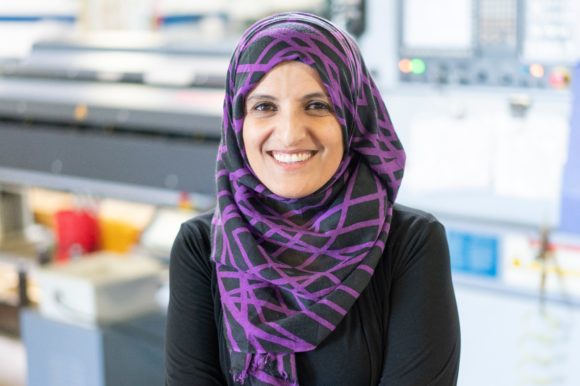Several months ago, I called Pioneer Service Inc. when I noticed online they had a used Doosan for sale. The woman who answered the phone beamed with enthusiasm. She told me that she couldn’t wait to come to work every day because of how much she loved her job and the company she worked for.
So, for our current season about how machining companies find good employees, I knew I needed to interview Aneesa Muthana, a favorite past guest on the podcast, and the co-owner and president of Pioneer Service Inc. What is Aneesa’s secret? What is in the Kool-Aid she is passing out to employees on the shop floor that gives them such passion for their jobs?
Pioneer Service is a Swiss machining company in Addison, Illinois, established in 1990 by Aneesa’s uncle. Aneesa joined her uncle as a partner in 1993, on the condition that she would assume full control of the operations of the company. When she came to the company it was an old school screw machine shop filled with Brown & Sharpes. In the last seven years the company has replaced its Brownies with a fleet of high-tech CNC turning equipment—mainly Star CNC Swiss lathes and a few turning centers. Aneesa says she particularly likes the output and reliability of the Stars. The company makes parts for many sectors such as medical, aerospace, biotech, and electric vehicles such as TESLA.
Aneesa grew up working at M & M Quality Grinding, a centerless grinding company her parents started. She says that at 11 years old, while cleaning tanks on the shop floor, she fell in love with the production business. Yet despite making a very good living at her family’s company, she left her job at age 23 when she felt she could could no longer progress in her career there.
When the Covid-19 crises hit in 2020, Aneesa was faced with the dilemma of whether to furlough employees when parts orders were put on hold. Despite some questioning from her management team, she chose to keep producing parts at current quantities, rather than furlough employees or cut overtime. She didn’t want to create instability in her 30-person workforce, and she anticipated correctly that orders would eventually resume.
Like many machining companies in 2021 Pioneer Service is having a great year, but despite having held onto her employees during the crises Aneesa says she is always searching for new good people and always has to try hard to keep the ones the company currently has.
She finds some new employees on LinkedIn but says the best ones usually are referrals from current or former employees. Pioneer Service pays competitive wages, starting at $17 per hour, and Aneesa says she is committed to creating a company culture where employees feel respected and valued, so it sometimes surprises her when employees are enticed to leave by competitors who offer very modest pay raises or perks.
Aneesa says sometimes applicants with experience seem to check all the right boxes for a position, but if she senses they will not treat coworkers well she will not hire them.
She says she is committed to having all her employees feel like their voices are being heard and that they belong. Half of Pioneer Service’s employees are women, and the company also employs some African Americans, a long underrepresented group in the machining industry. A workplace where people feel comfortable and accepted is vital to maintain such a diverse group.
Aneesa has recently become a payed professional speaker, and often she is asked to speak on behalf of women in manufacturing. I asked her if she gets tired playing the role of “the woman advocating for women in manufacturing.”
She says she likes to talk about women in manufacturing to empower them. She wants to educate and inspire women leaders to participate in male dominated industries. Also, inspiring women does a service to society and the economy because it brings more quality people into the workforce.
Aneesa also wants expose other groups besides women to opportunities in manufacturing such as young people or people in the inner-city. She says to be successful in a profession people need to feel like they belong, so it is up to business owners and leaders to make people feel that way.
She tells audiences that although machining is a male dominated industry, she hangs with the guys, and they’re not monsters. She says women can’t portray men as villains and then expect them to accept them. She says it’s good for people to talk about their pain, but everyone, no matter what background, has gone through pain, so it’s important not to feel like a victim and blame others.
Question: Did your company keep all its people during the pandemic? Why?
Podcast: Play in new window | Download




